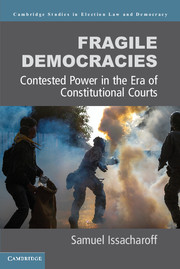Preface
Published online by Cambridge University Press: 05 July 2015
Summary
About a decade ago I began to redirect a significant part of my academic focus away from the study of the law of American democracy. My new attention was the product of a renewed sense of common enterprise across democracies that emerged from two critical events. The first was the contested presidential election of 2000; in particular, the failure of the Florida electoral machinery to produce a clear result and the subsequent intervention of the Supreme Court in Bush v. Gore. The second was the emergence of difficult national security decisions within the United States following the attacks of September 11. Each represented a significant challenge to the structure and integrity of American democracy, each exposing a characteristic vulnerability of democracy either to process failure from within or to external enemies.
In the aftermath of these events, I began to wonder more systematically about how other democracies deal with such challenges. American democracy is no doubt exceptional in its duration and in its constitutional pedigree. But it has also had the benefit of a relatively stable political order and geographic isolation (or insulation) from potential military threats. What if the workings of democracy in this country were themselves challenged? Or, what if the War on Terror forced a recalibration of the delicate balance between liberty and security?
If American democracy were suddenly more vulnerable, perhaps the experiences of other democracies would help in thinking about the resulting challenges. This inquiry assumes no universalism of law, no sense that a foreign consensus should obligate a response in American law – although it does not presume either that informed judgments from abroad should be rejected per se because of their foreign origins. Rather, comparative assessments sometimes help to illuminate certain characteristics of domestic difficulties that might otherwise be obscured by their apparent intimate relations to our lived experiences.
- Type
- Chapter
- Information
- Fragile DemocraciesContested Power in the Era of Constitutional Courts, pp. ix - xiiPublisher: Cambridge University PressPrint publication year: 2015



